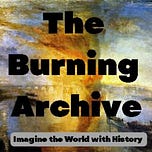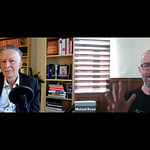“Americans are explorers, builders, innovators, entrepreneurs, and pioneers. The spirit of the frontier is written into our hearts. The call of the next great adventure resounds from within our souls.
… And we will pursue our manifest destiny into the stars, launching American astronauts to plant the Stars and Stripes on the planet Mars. (Applause.)
Donald Trump, 2025 Inauguration Speech
Donald Trump’s speechwriters evoked both Star Trek - crossing space, the final frontier, all the way to Mars - and a classic historical essay on American character and the spirit of the frontier.
Frederick Jackson Turner's 1893 essay "The Frontier in American History" defined an American tradition of history writing. You ought to read it to understand its influence. That is why I have recorded an audiobook mini of the essay for this post.
But you should also read more recent histories, so you do not fall for the rhetoric of the USA’s final frontier fantasy.
My history book recommendation this week offers a quite different story of the American frontier and American nations. It is Kathleen Duval, Native Nations: A Millennium in North America (2024). It won the Cundill History Prize last year. It will exorcise the evil spirits of the frontier from your soul.
Turner, "The Frontier in American History"
First, what is the importance of Frederick Jackson Turner, "The Frontier in American History," and why have I featured it as a classic history essay in my world history tour of America?
Turner argued that the American frontier experience fostered individualism, democracy, and a distinctive national character. The continuous process of taming wilderness, he claimed, produced an American spirit that was pragmatic, optimistic, self-reliant, and endlessly reinventing itself. While most modern historians discount Turner's framework, his ideas remain deeply embedded in American political mythology and self-conception.
This persistence is demonstrated by Trump’s inauguration speech and J.D. Vance’s hillbilly harangue against Old Europe at the Munich Security Dialogue. They both draw on frontier-era imagery of rugged individualism and American exceptionalism. They both borrow Turner’s ideas, without knowing the depth of the history.
Despite modern history surpassing this essay from the era of President McKinley, it is still worth listening to this classic. The actual voice of the past often differs from the cliched imagery of political speeches. It often contains surprises, good and bad. In the case of Turner’s essay, one surprise is the importance he attaches to the American frontier Indian wars.
History Book recommendation: Kathleen Duval, Native Nations
A new history of the relationships between the many nations that have occupied North America over the last thousand years is then a corrective to common American self-conceptions.
Kathleen DuVal, Native Nations: A Millennium in North America (2024) offers a comprehensive and groundbreaking perspective on Indigenous history in North America.
DuVal challenges traditional narratives by placing Indigenous power and agency at the centre of her historical account. She demonstrates that Native American societies were complex, sophisticated, and diverse long before European American arrival. The book explores how these nations adapted to climate change, developed egalitarian government structures, and built complex economies.
When European Americans arrived in the 16th century, they encountered well-established societies whose power they often underestimated. DuVal illustrates how Indigenous peoples maintained the upper hand for centuries, using European Americans to pursue their own interests. For instance, she describes how Mohawks controlled trade with the Dutch and influenced global markets, while Quapaws manipulated French colonists.
The author also highlights the resilience and adaptability of Native nations in the face of European American encroachment, assimilationist policies, and climate change. She connects historical events to present-day Indigenous communities, emphasizing their ongoing cultural, political, and economic influence.
DuVal reframes the story of North America from the Birth of One Nation to the entanglement of many nations. In ways it builds on Felipe Fernández-Armesto’s retelling of the American story, as the weaving of Turner’s westward march across the frontier and the northward spread of Hispanic America, including the encounters with native nations and empires.
You can watch Kathleen Duval discuss her book in less than an hour in this video.
The Closing of the Age of American Expansion?
Turner’s essay began with the US Government declaring the closure of the frontier in the 1890s. Where would its restless spirit of expansion go? Within years the USA had seized Cuba, the Philippines, and Panama for the Canal. It declared the twentieth century its own and then after 1945 expanded its undeclared empire across the globe. After 1989, as the Biden administration liked to say, the American system went global. The USA keeps renewing its final frontier fantasy. In 2025 Trump mapped it to Mars.
Eighty years after 1945, the Cold War era is being reinterpreted as the Age of American Expansion. But that frontier has now closed. Stuck on Planet Earth, Trump is left to bully Greenland and the other nations of the Americas.
An intriguing counterpoint to Turner's "The Frontier in American History" comes from historian John Darwin, After Tamerlane. Darwin inverts Turner's framework by positioning America not as a self-contained frontier phenomenon, but as the western frontier of Greater Europe.
In my deep dive next Wednesday, I will explore Darwin's idea. His reframing suggests that American development was never exceptional. It was integrated into the Invention of the West. It offers an historian’s perspective on the current split between the USA and the European Union. It might change your mind about the rhetoric of J.D. Vance and people from across the American political spectrum on democracy in the New and Old Worlds.
All subscribers get a preview of my weekly deep dives. If you are curious about learning from history, then upgrade your subscription to go deeper with my world history tour of world powers.
Thanks for reading
❤️
Jeff
P.S. Vaclav Havel used to sign his letters as President of Czechia with a ❤️. So I thought I would try it too.










Share this post